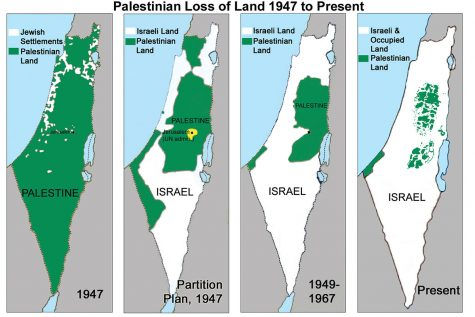Often in the West, when someone says anything that is against the Israeli state, that person is automatically labelled an anti-Semite. In reality, however, going against the Israeli state and it’s political agenda is called anti-Zionism. Anti-Semitism and Anti-Zionism are often used synonymously and this couldn’t be further from the truth.
Anti-Semitism is prejudice or hatred towards Jewish people. It is a real and serious problem that has been present in the past and is still present today. Anti-zionism is the opposition to Zionism. Zionism is a nationalist movement established by Theodore Herzl that promotes the return of the Jewish people to their historic homeland, which also happens to be modern-day Palestine. Today, this has become a political movement which promotes expansionist policies at the expense of Palestinians. If we use these definitions of the terms in question, it is clear that anti-Semitism and anti-Zionism are very different from each other: one is a dislike for a religion while the other is against a political ideology.
Anti-Semitism is a pressing issue to this day and is inexcusable. Jews have been subjected to various forms of persecution- one of the biggest and most horrific displays of this was the Holocaust during the Second World War. Throughout history, they have been one of the most persecuted groups and unfortunately we still see this today across the world, especially in the West. As recently as October 2018, there was a shooting in a synagogue in Pittsburgh, Pennsylvania. Eleven people were killed in this act of pure anti-Semitism. While in Germany, anti-Semitic crimes, including hate speech, rose by 20% in 2018.
Zionism, on the other hand, is a political ideology followed by the state of Israel for the development and protection of a Jewish nation, nowadays mostly through the forceful occupation of land Palestinians inhabit. During the early 20th century, Zionist forces carried out a process of ethnic cleansing whereby 750,000 Palestinians were displaced and over 400 villages were destroyed. This conflict is still present in its full force today: as of November 2019, Israeli security forces killed 23 Palestinians and injured a further 3,221 in the West Bank. The situation in Gaza isn’t any better; around the same time, Israeli forces killed 71 and injured 11,453 Palestinians.
Initially, Zionism came about from religious sentiments which advocated for the return of the Jews to the Holy Land. It was a highly attractive solution for European Jews who had been severely persecuted for centuries. However, this movement quickly changed into one which promotes expansionism of Israel at the expense of the Palestinians. Today, Israel is a settler-colonial state whereby the Palestinians are removed from their own homeland. This is indeed ironic considering the horrific circumstances Jews have had to endure throughout history.
Before Israel was created in 1948, Muslims, Christians, and Jews all lived harmoniously in Palestine for hundreds of years. So a movement that wanted a separate state for all European Jews meant that all the non-Jewish inhabitants would be displaced. The Balfour Declaration, created in 1917, was a statement by the British government that voiced its support for the creation of a new Jewish state. Palestinians, who lived on the land that was to be taken to become Israel, were never consulted about it. This raises the question: how is any of this fair? And doesn’t going against an ideology that promotes all this injustice ultimately justified?
While Israel was initially created by taking a part of Palestine, in the years since 1948, Israel has slowly expanded to the point that now the only land that belongs to Palestine is Gaza, the West Bank and other small territories.

This is why Zionism is a problem: it has led to hundreds of thousands of Palestinans being displaced or having to become refugees in other countries. As of 2019, there were 5.4 million Palestinian refugees in Gaza, occupied West Bank, Lebanon, Syria, and Jordan.
Nowadays, in Western politics, attempts to go against the Israeli state are automatically labelled as antisemitic and being pro-Palestine is criminalised. The fact that anti-Zionism and anti-Semitism are associated synonymously is used to mask the real problem: Zionism is a nationalist movement (some might say even a terrorist movement) that has taken the land of a whole group of people and is continuously oppressing that very group. The issue is not a religious one, but a political and ideological one. This conflation of terms also mask the issue of anti-Semitism. If something that is not actually antisemitic is claimed as being such, then the actual discrimination that Jews face will go unnoticed. Governments that conflate anti-Zionism with anti-Semitism themselves often do not do enough to address anti-Semitism within their own border.
An analogy that illustrates the absurdity of confusing anti-Zionism and anti-Semitism is the United States and American Protestants. Being against the policies of the United States does not automatically mean that people are against Protestants who were the people who the first colonists in what would become the US and who, to this day, have the most influence in the US political system. The former is simply an ideology that is unrelated to the latter, which is a religious belief. This is the same in the case of anti-Zionism and anti-Semitism: to go against Zionism, which is a political ideology that just so happens to be one made by Jews and practiced by Israel, does not mean that you are against the whole entire religion.
Recognizing and reproaching the atrocities committed by the Israeli state does not make one antisemitic. Confusing the two is dangerous and prevents us from getting closer to solving the Israel-Palestine conflict. Instead, all it does is dodge the actual problem which is that there is a political ideology (one that is unapologetically supported by the West) that aims to expand and remove indigenous Palestinians from their land.

Comments